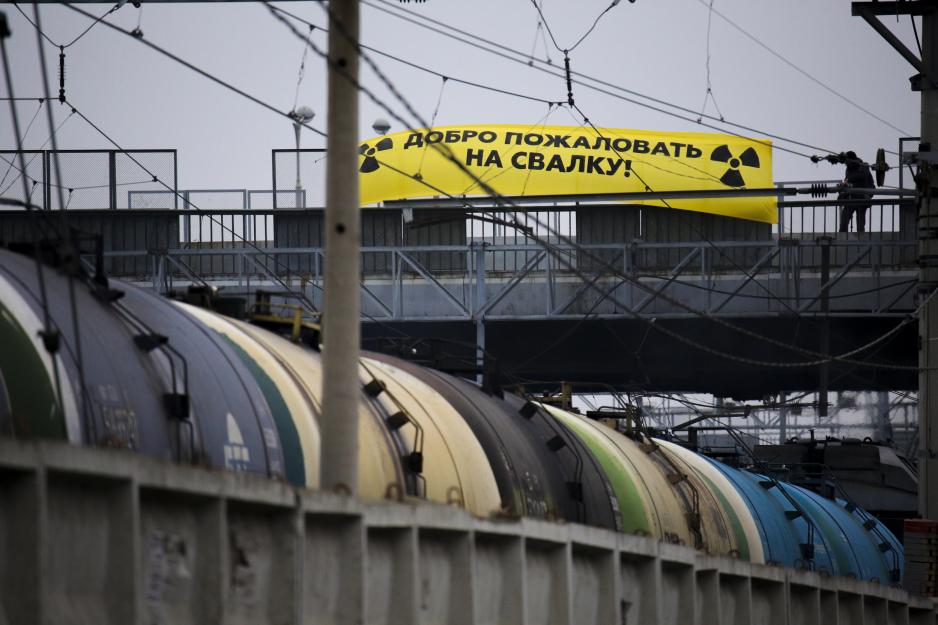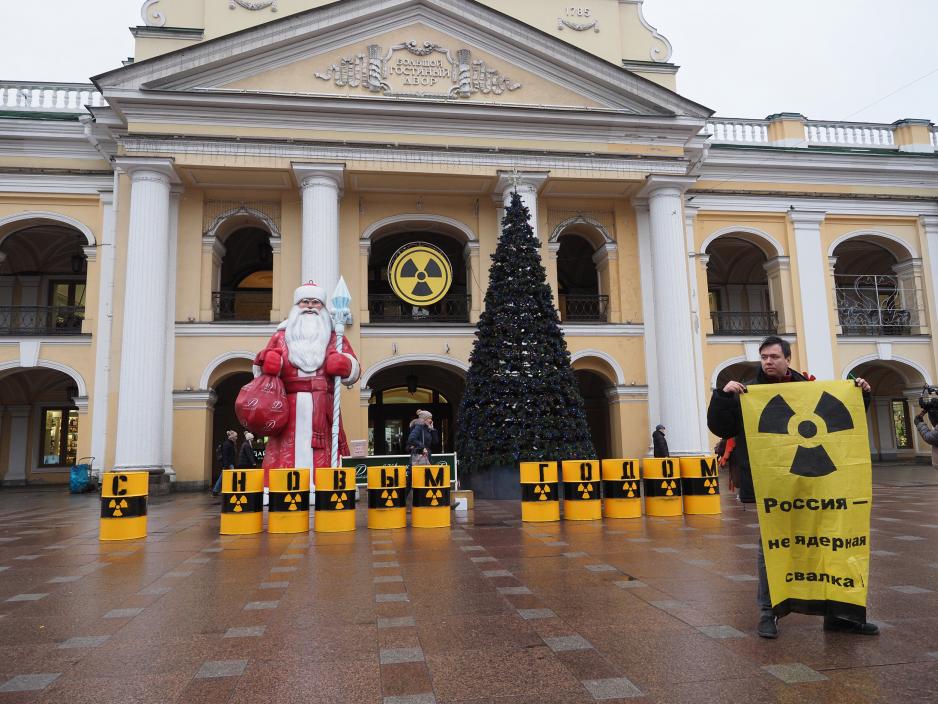Russia Has Once Again Become the Solution to Germany’s Nuclear Problem

A warm welcome to the dump, says this poster placed at St. Petersburg harbor by Greenpeace late last November. A new cargo ship had then arrived from Amsterdam with depleted uranium. Photo: Valentin Egorshin/Greenpeace
Below everyone’s radar, Russia has once again started importing depleted uranium from the German nuclear power industry. Greenpeace now warns that Russia may end up as a radioactive dumping ground for other countries’ nuclear waste.
Russia’s decision about permitting imports of depleted uranium again has sparked a debate about whether the country is to brand itself as a dumping ground for other countries’ nuclear leftovers.
The environmental organization Greenpeace last year revealed that Russia and Germany have resumed trade with depleted uranium, used in German nuclear power industry. During a three-year period, four different storages in Russia are to receive some 12,000 tons of uranium hexafluoride, that is; what is left in uranium following the extraction of materials used as fuel at nuclear power stations.
The company Urenco and the state-owned Russian nuclear agency Rosatom in 2009 halted imports of depleted uranium following revelations about poor storing. Back then, this waste was stored out in the open in metal containers, with rather poor security measures.
Russia wants to reuse
German media have revealed that shipping was resumed in May 2019 and that in the period up to October last year, some 3,600 tons of depleted uranium was shipped to storages in central Russia. A total of 12,000 tons of nuclear waste are to be imported to Russia up until 2022. This sparks heavy criticism from the environmental movement.
“The problem is that this uranium will be reprocessed in Russia. Only ten percent will be returned to Germany”, says Konstantin Formin, Media Coordinator of Greenpeace Russia.
Russian authorities argue that the material is not nuclear in and of itself, but rather a raw material that can be re-used in future power production at new kinds of nuclear power stations.
However, the developing of such plants, in which one can use depleted uranium with low radio activity, is not by far complete, according to Greenpeace. The world currently has only two such plants, one in Russia and one in France. It may take decades to completely develop this technology.
Following the Fukushima accident in Japan, Germany decided in 2011 to phase out its nuclear power plants. By 2022, all German nuclear power plants are to be shut down and the country now needs ways in which it can get rid of its waste.
“Most likely, behind the pretty picture painted by Russian authorities, this is an agreement about managing nuclear waste for Germany. It is a cheaper way for Germany to rid itself of this waste than if it were to manage it itself”, Fomin says.
Greenpeace argues that there is no evidence that Russia will use this material in its future power production.
“They want us to believe their words without there being any plans for how to use this”, says Fomin.

“Happy new year” says the text on the yellow barrels placed at the famous landmark Gostiny Dvor in downtown St. Petersburg. Greenpeace is protesting against Russia’s having resumed imports of depleted uranium. Photo: Greenpeace Russia
The world’s nuclear dumping ground
The import of nuclear materials is prohibited, both in Russia and in Germany. However, if one claims to reuse the materials, they are no longer waste, but rather a raw material. This is a clever way of using the law, says Fomin.
“Long-term storing of this nuclear waste is costly. We do not want future generations to have to struggle with this problem. It will not disappear in 50 years. If the authorities do not keep their promises, Russians will have to live with this for generations to come.”
“In our opinion, the nuclear industry is not a solution to the climate crisis. The major problem here are those ’90 percent’. It is good for the German industry to get rid of this, however, it is not good for the Russian people. We do not understand why Russia should take this risk”, Fomin says.
When asked if Greenpeace fears that Russia will become a nuclear dumping ground for depleted uranium from all over the world, Fomin answers:
“What is interesting is that ten years ago, we had the same campaign against importing uranium from Germany and France. Exactly the same arguments were used then. The outrageous about this deal is the fact that Rosatom has broken its promises. There is no new technology. The only thing that has changed, is that civil society in Russia is weaker today and cannot protest the way it did 10 to 15 years ago”, Fomin says.
Shipped by boat
The environmental organization Bellona also monitors the case closely. Oskar Njaa, head of its international division, says the shipping and storing of uranium in and of itself does not constitute a major security problem.
“What is problematic for many in this case, is more related to the fact that Russia takes on the responsibility for waste that other countries should manage themselves. Some consider it waste, while others argue it is a resource that can be reused in the nuclear industry”, Njaa says.
Bellona also argues that the information about the purposes for which this material is to be used has been too poor. The material is currently shipped by boat from Amsterdam to St. Petersburg, and then onwards by train to central areas of Russia. The waste that has arrived in Russia since May last year has been sent to a storage facility in Novouralsk, near Yekaterinburg.
This article was originally published in Norwegian and has been translated by HNN's Elisabeth Bergquist.

